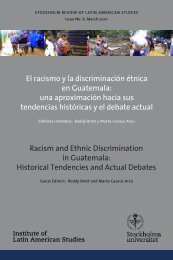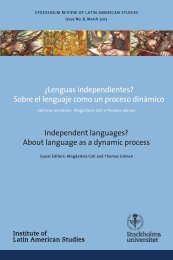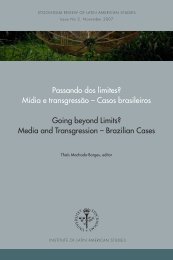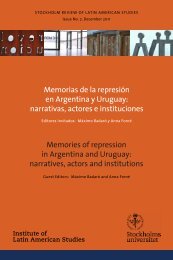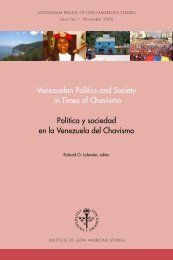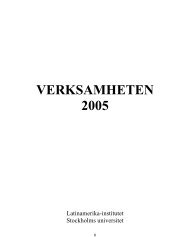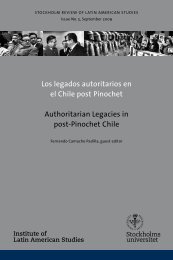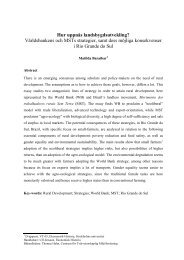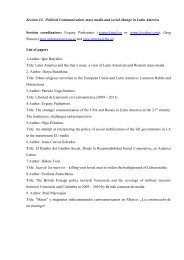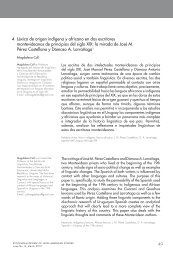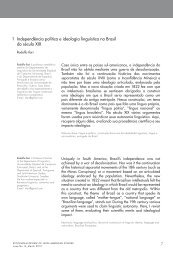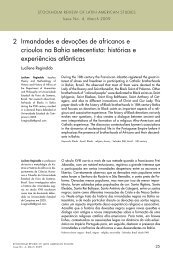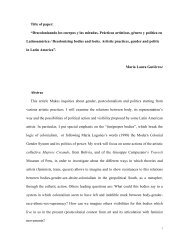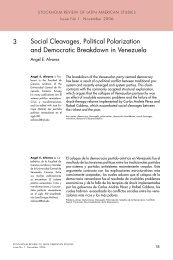Papers - Conference 2009 - Institute of Latin American Studies
Papers - Conference 2009 - Institute of Latin American Studies
Papers - Conference 2009 - Institute of Latin American Studies
Create successful ePaper yourself
Turn your PDF publications into a flip-book with our unique Google optimized e-Paper software.
parapolitica) drug-related violence steeped in terrorism and all kinds <strong>of</strong> so-calledordinary criminality. During the Nineties, the annual number <strong>of</strong> violent deathsoscillated between twenty-five and thirty thousand, representing a national rate <strong>of</strong>eighty deaths per one-hundred thousand inhabitants, one <strong>of</strong> the highest rates in theworld. At least thirteen percent <strong>of</strong> these deaths (three to four thousand) are due topolitical violence that is massacres, disappearances or homicides perpetrated bystate agents or members <strong>of</strong> one <strong>of</strong> the armed groups in conflict against civilianpopulation. (CCJ, 2004, 4).The multiplicity <strong>of</strong> actors, the loss <strong>of</strong> the war ideology (because <strong>of</strong> the use <strong>of</strong>terror instead <strong>of</strong> the appeal for social support), and the fuelling <strong>of</strong> the conflict bydrug trafficking have led to Colombia’s diminished position in terms <strong>of</strong>international humanitarian law and also resulted in territorial fragmentation.The current situation has been shaped by a difficult and changeable politicalcontext based on: the collapse <strong>of</strong> the peace dialogues during the Pastranagovernment (1998-2002) with the Fuerzas Armadas Revolucionarias de Colombia(FARC) guerrilla group; the dismantled or demilitarised zone in 2002; the electionby absolute majority <strong>of</strong> President Alvaro Uribe and the suspension <strong>of</strong> the peacedialogues with the guerrilla force Ejército de Liberación Nacional (ELN). Afterthe new president took <strong>of</strong>fice in August 2002, a series <strong>of</strong> new and highly contestedmeasures were taken by the new government: the declaration <strong>of</strong> a state <strong>of</strong>exception; provisions allocated for a million civilian informants or“colaboradores” as paid by the government; the election <strong>of</strong> a re-elected president,as if he were new; and the peace dialogue between the Uribe government andparamilitaries (Autodefensas Unidas de Colombia - AUC) with the purpose <strong>of</strong>demobilising the paramilitary structure and inserting it into civil society, underthe so called “Peace and Justice law” 2 . In the context <strong>of</strong> ongoing conflict, theincreasingly complex dynamics <strong>of</strong> war, the regionalising <strong>of</strong> motives and actors,and the rapidly changing territorial configurations, the search for examples <strong>of</strong>social reconstruction is not an easy task. Rodrigo UPRIMNY speaks <strong>of</strong> the2law 975 <strong>of</strong> 20055



